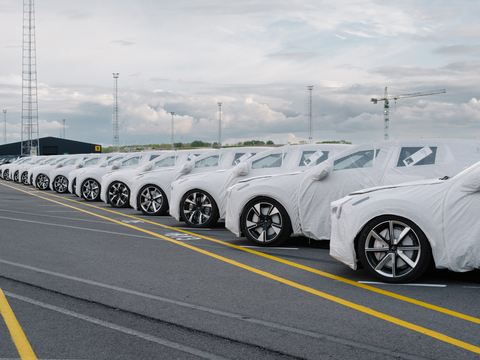Polestar Reduces Supply Chain Emissions Through Integration of Renewable Fuels for Ocean Freight
Polestar (Nasdaq: PSNY) is integrating renewable fuels on its ocean freight routes, which account for around 75% of its total transportation emissions. The company is operating its Vehicle Processing Center (VPC) in Belgium with 100% renewable electricity. Renewable fuel will be used for approximately 65% of outbound ocean freight from Asia to Belgium, with plans to extend this to North America. Utilizing B30 Biofuel, which contains 30% Fatty Acid Methyl Esters (FAME), emissions from these routes can be reduced by 20-25%. Polestar's use of 100% FAME fuel for inter-continental inbound ocean freight reduces greenhouse gas emissions by 84%. The company aims for climate neutrality by 2040 and has reduced greenhouse gas emissions per sold car by 9% during 2023 compared to 2022.
- Polestar is integrating renewable fuels in ocean freight routes, reducing emissions by 20-25%.
- The Belgium VPC operates on 100% renewable electricity.
- Polestar plans to use renewable fuels for outbound freight to North America.
- Utilizing 100% FAME fuel for inter-continental freight has reduced emissions by 84%.
- Polestar has achieved a 9% reduction in greenhouse gas emissions per sold car in 2023 compared to 2022.
- The company is committed to climate neutrality by 2040.
- The transition to renewable fuels covers only 65% of outbound ocean freight initially.
- Plans to integrate renewable fuels for North American routes are not immediate and depend on production expansion.
- The full transition to renewable fuels and electricity might incur significant costs.
Insights
Polestar's integration of renewable fuels for ocean freight is a noteworthy step towards reducing global transportation emissions. The use of B30 Biofuel, which reduces emissions by about
Moreover, the commitment to 100% FAME fuel for inbound ocean freight is impressive, reducing greenhouse gas emissions by
The choice of renewable sources like waste cooking oil, excluding palm oil-related feedstock, is important in addressing ethical and environmental concerns. This move aligns with global sustainability trends and regulatory pressures, potentially giving Polestar a competitive edge in the EV market.
Polestar's initiative to cut emissions through renewable fuels aligns well with the growing consumer and regulatory demand for sustainability. As the company ramps up production of the Polestar 3 and Polestar 4, integrating renewable fuels in their logistics could enhance their appeal to eco-conscious consumers and investors.
The transition to renewable fuels not only supports Polestar’s goal of becoming climate neutral by 2040 but also showcases their proactive approach in decoupling growth from emissions. This could potentially influence market dynamics, with Polestar setting a benchmark for other automotive companies. Investors should consider the potential for increased brand loyalty and market share in the competitive EV space.
However, there will be challenges to monitor, such as the cost and availability of renewable fuels. The impact of these factors on Polestar's operational costs and pricing strategy could affect their profitability in the short term. Overall, this strategic move seems to position Polestar favorably in the evolving automotive market.

(Photo: Business Wire)
Polestar is now also operating its Vehicle Processing Center (VPC) in
With Polestar 3 and Polestar 4 production now ramping up, renewable fuel will initially be used for approximately
Polestar has taken steps to decarbonize inter-continental inbound ocean freight for production materials and spare parts distribution, which are now running on
Jonas Engström, Head of Operations at Polestar, says: “This is an important step in Polestar’s goal to reach climate neutrality by 2040. Becoming truly climate neutral means eliminating all greenhouse gas emissions across our operations, and all phases of our cars’ life cycles, including emissions from the supply chain. As we enter an accelerating phase of growth with our model line-up and manufacturing footprint expanding, there is an extra emphasis on the need for sustainable logistics solutions.”
Polestar recently published its Sustainability Report for 2023. Greenhouse gas emissions per sold car were reduced by
Forward Looking Statements
This press release contains statements that are not historical facts, but rather forward-looking statements within the meaning of Private Securities Litigation Reform Act of 1995. Such forward-looking statements include those that address activities, events or developments that Polestar or its management believes or anticipates may occur in the future. All forward-looking statements are based upon, as applicable, our current expectations, various assumptions and data available from third parties. Our expectations and assumptions are expressed in good faith and we believe there is a reasonable basis for them. However, there can be no assurance that such forward-looking statements will materialize or prove to be correct as forward-looking statements are inherently subject to known and unknown risks, uncertainties and other factors which may cause actual future results, performance or achievements to differ materially from the future results, performance or achievements expressed in or implied by such forward-looking statements. Numerous risks, uncertainties and other factors may cause actual results to differ materially from those set out in the forward-looking statements, including those risks and uncertainties set forth in the sections entitled “Risk Factors” and “Cautionary Note Regarding Forward-Looking Statements” in Polestar’s Form 20-F, and other documents filed, or to be filed, with the
View source version on businesswire.com: https://www.businesswire.com/news/home/20240605217610/en/
Theo Kjellberg
Head of Corporate PR
theo.kjellberg@polestar.com
Emelie Arvidsson
Corporate PR
Emelie.arvidsson@polestar.com
Source: Polestar







